We observe, research, and share knowledge to transform education.
We believe in an education that recognizes the greatness of every mind. We connect educators, researchers, and learning communities to generate knowledge and transform education through the lens of Neuroeducation. We celebrate the diversity of learning forms and embrace neurodivergence as a unique expression of creativity, sensitivity, and talent. Because true innovation arises when every voice is heard and every way of learning is valued.
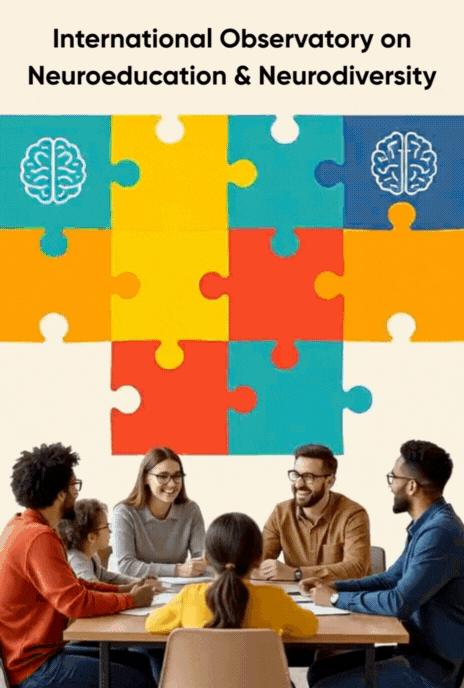


Check our
2025 Calls for Applications
This is a professional and comprehensive English translation of your text, maintaining the formal and academic tone required.
The International Observatory of Neuroeducation and Neurodiversity (IONN) is a pioneering initiative that seeks to integrate scientific knowledge with educational and social practice, advancing our understanding and support of neurological diversity and the application of neuroscience findings to education and human well-being.
Core Purposes
Study and Understand brain function and its neurological variations, including conditions such as autism, ADHD, dyslexia, dyspraxia, among others, as well as human learning and development processes from a cognitive neuroscience perspective.
Drive Interdisciplinary Research, generating evidence that links neuroscience, education, psychology, health, and technology.
Translate scientific evidence into better educational, health, and social practices, fostering inclusion, pedagogical innovation, and equity.
Promote Awareness and International Collaboration, building a bridge between academic knowledge, professional practice, and society.
Philosophy
The IONN is founded on four pillars:
Neurodiversity: The recognition of neurological variability as a natural part of the human condition.
Cognitive neuroscience: The application of neuroscience to learning, teaching, and the design of more effective and inclusive educational environments.
Interdisciplinary Science: The integration of neuroscience, psychology, pedagogy, sociology, and technology.
Equity and the Social Model of Disability: Promoting environments that reduce barriers and strengthen the capabilities of all individuals.
Analysis of the Current Landscape
Growing Recognition: Both educational neuroscience and neurodiversity are gaining increasing relevance in scientific, educational, and social fields.
Interdisciplinary Nature: Neuroscience converges with education, health, sociology, and technology; an observatory can become an essential articulating center.
Data Collection and Analysis: Neuroscientific and educational research generates large volumes of data; a centralized space would allow for analysis and translation into practical actions.
Technological Advancements: Neuroimaging, artificial intelligence, genetic analysis, and digital platforms open new opportunities for understanding the brain, learning, and neurological differences.
Need for a Centralized Resource: Information is fragmented; an observatory would serve as a core reference point and knowledge transfer hub.
Strategic Objectives
Data Aggregation and Analysis: Systematize information on learning processes, brain plasticity, the prevalence of neurodivergent conditions, and lived experiences.
Promotion of Interdisciplinary Research: Generate evidence on how people learn, how neurological profiles vary, and which pedagogical, clinical, and social strategies prove most effective.
Knowledge Dissemination: Produce and distribute clear, accessible, and evidence-based information for researchers, educators, families, health professionals, and policymakers.
Identification of Best Practices: In education, health, and occupational/social inclusion, both for neurodivergent individuals and for the general improvement of teaching and learning processes.
Advocacy for Public Policies: Recommend and support regulatory frameworks that promote inclusion, educational innovation, and holistic well-being based on neuroscience and cognitive neuroscience.
Public Awareness and Education: Reduce stigma, combat myths, promote scientific literacy, and foster appreciation for cognitive diversity and advances in neuroscience.
International Collaboration: Establish networks with research centers, universities, and organizations working in cognitive neuroscience, neurosciences, and neurodiversity.
Development of Tools and Resources: Contribute to creating and validating diagnostic, evaluation instruments, and pedagogical methodologies aligned with neuroscience and the diversity paradigm.
Neurodivergences: Research, Understanding, and Treatment.
"
A reference space for cognitive neuroscientific research and action
The International Observatory on Neuroeducation and Neurodiversity was established with the purpose of analyzing, generating, and disseminating knowledge that promotes inclusive education — grounded in science and oriented toward the well-being of teachers, school leaders, students, and families.
Mission
To advance the understanding, application, and dissemination of neuroscience and cognitive neuroscience, while promoting the acceptance and inclusion of neurological and cognitive diversity. Through rigorous research, interdisciplinary collaboration, and the transfer of evidence-based knowledge, we seek to empower individuals, enrich educational processes, and contribute to the creation of a more equitable and innovative society.
Vision
A world where neuroscience and cognitive neuroscience serve as catalysts for social transformation, and where neurological diversity and different learning forms are recognized and celebrated as valuable expressions of the human condition. We aspire to a society in which all individuals are understood, supported, and empowered to reach their fullest potential within truly inclusive educational, social, and professional environments.
Are you an educator at any level, a researcher in fields related to the brain, mind, and human learning, or a professional who provides therapeutic, educational, or clinical care to individuals with diverse neurological profiles?
We cordially invite you to join the International Observatory of Neuroeducation and Neurodiversity, the premier community dedicated to synthesizing scientific and educational knowledge about the brain, learning, and neurological diversity.
Your participation will allow us to enrich the understanding of cerebral and educational processes, strengthen support practices, and build more inclusive and innovative environments for all individuals.
Membership Benefits
The benefits for our members are multifaceted and significant, providing value on both a personal and professional level:
Access to Cutting-Edge Knowledge and Continuing Education
Research and Latest Advancements: Privileged access to studies, findings, and discoveries across neuroscience, cognitive neuroscience, and neurodiversity. This includes contributions on brain development, cognition, learning processes, pedagogical innovation, and well-being across diverse neurological profiles.
Specialized Educational Resources: Training materials, webinars, workshops, and courses designed both to enhance understanding of neurodiversity and to apply neuroscientific principles in educational, clinical, and social practice.
Applied cognitive neuroscience: Tools and strategies based on the science of learning and brain plasticity, useful for designing more inclusive and effective educational, family, and work environments.
Professional Community and Networking
Being part of the observatory fosters the creation of an invaluable support and collaboration network:
Connection with Experts: Interaction with leaders, researchers, and professionals in neurosciences, cognitive neuroscience, and cognitive diversity.
Best Practice Exchange: Collaborative spaces to share experiences, challenges, and solutions that enrich collective knowledge.
Project Collaboration: Opportunities to integrate into joint initiatives for research, pedagogical innovation, or social inclusion programs.
Professional and Personal Development
The benefits extend to the individual growth of each member:
Enhanced Skills: Development of key competencies in identification, support, and intervention, both within the educational sphere and in contexts related to neurodiversity.
Expanded Perspective: A deeper and more empathetic understanding of how neuroscience and cognitive neuroscience explain the variability in learning and cognition.
Well-being and Self-Efficacy: For families and caregivers, access to reliable information and a supportive community that strengthens confidence and reduces stress.
Academic and Scientific Dissemination: The Observatory promotes the publication of innovative articles in neurosciences, cognitive neuroscience, and neurodiversity, thereby strengthening the production of knowledge.
Advocacy and Social Impact
The Observatory doesn't just inform—it also acts as a catalyst for transformation:
Advocacy and Awareness: Participation in campaigns and initiatives that promote inclusive public policies and scientific literacy regarding the brain and cognitive diversity.
Resource Generation: Development of guides, protocols, and educational and clinical materials that benefit broader communities.
Visibility and Leadership: Opportunities for members to position themselves as leading figures in the field of cognitive neuroscience, neurosciences, and neurodiversity, actively contributing to a more equitable society.
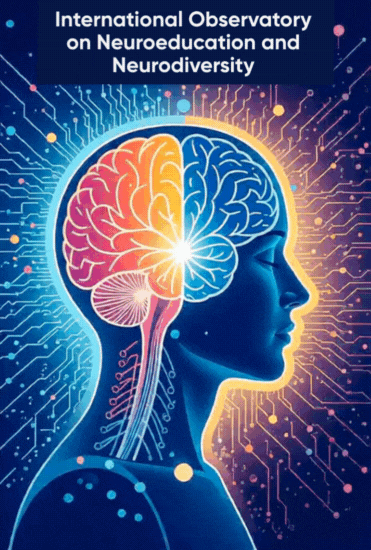

The International Observatory for Neuroeducation and Neurodiversity (IONN) is fundamentally based on the integration of the neurodiversity paradigm, advancements in neuroscience, and the practical application of cognitive neuroscience. It recognizes that neurological differences are a natural part of human variability, while simultaneously seeking to leverage scientific knowledge to improve learning processes, social inclusion, and holistic well-being.
Core Philosophical Principles
Respect for Neurological and Cognitive Variation: Acknowledges and values the diverse ways human brains function and how these influence learning, development, and daily life.
Strengths-Based Approach: Focuses on the unique talents, potential, and capabilities that each neurotype and learning form can contribute, alongside the recognition of the challenges they face.
Person-Centered Perspective: Prioritizes the lived experiences of individuals and communities, incorporating them into research, educational policies, and professional practices.
Social Model of Disability and Educational Barriers: Understands that many difficulties stem from a lack of adaptations in school, work, and social environments, rather than from the neurological profiles themselves.
Inclusivity and Equity: Works to ensure equal opportunities in access to education, health, and social participation, integrating principles of cognitive and educational justice.
Evidence-Based Practice: All actions are supported by rigorous neuroscientific research and validated pedagogical application, ensuring that recommendations are solidly grounded.
Importance of the Observatory
The International Observatory for Neuroeducation and Neurodiversity is crucial for several reasons:
Enhanced Scientific and Educational Understanding: Broadens the vision of how the brain functions in its various manifestations and how to apply this knowledge in educational, therapeutic, and social contexts.
Advancements in Support and Intervention: Allows for the identification of pedagogical, clinical, and social strategies that are more effective, personalized, and aligned with brain function.
Reduction of Stigma and Misinformation: By disseminating clear, evidence-based information, it helps to demystify both neurodiversity and neuroscience findings, promoting acceptance and respect.
Empowerment of Communities and Individuals: Offers resources that strengthen the autonomy of neurodivergent individuals, families, educators, and professionals, fostering active participation in society.
Social Benefit and Innovation: By recognizing and leveraging cognitive diversity and neuroscience findings, it contributes to fostering creativity, educational innovation, and social resilience.
More Effective Educational and Social Policies: Generates evidence that can inform the design of inclusive, equitable, and scientifically informed policies at local, national, and international levels.
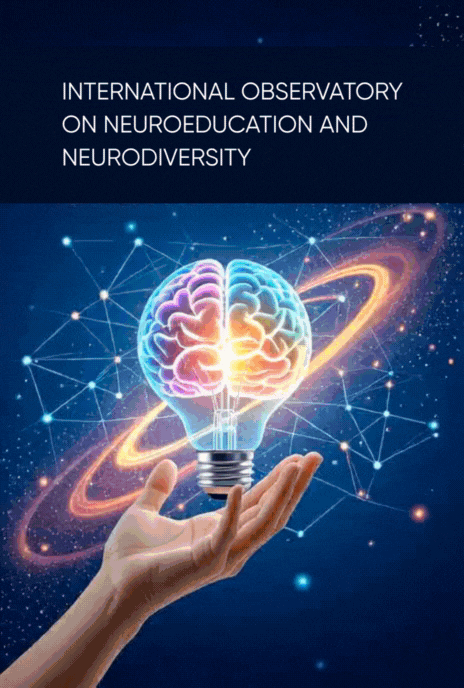

We monitor, research, and disseminate knowledge to transform education.
The Observatory is a space for analysis and reference that:
Monitors scientific advances in cognitive neuroscience and neurodivergence.
Generates data and evidence to guide educational policies and practices.
Promotes inclusion and well-being for students with diverse learning forms.
Connects the educational community with updated research and resources.
In summary, the International Observatory of cognitive neuroscience and Neurodiversity is far more than an information repository; it is a vibrant, interdisciplinary community that drives knowledge, collaboration, and action. Its mission is to build a more comprehending, inclusive, and innovative world, adapted to all minds and ways of learning.
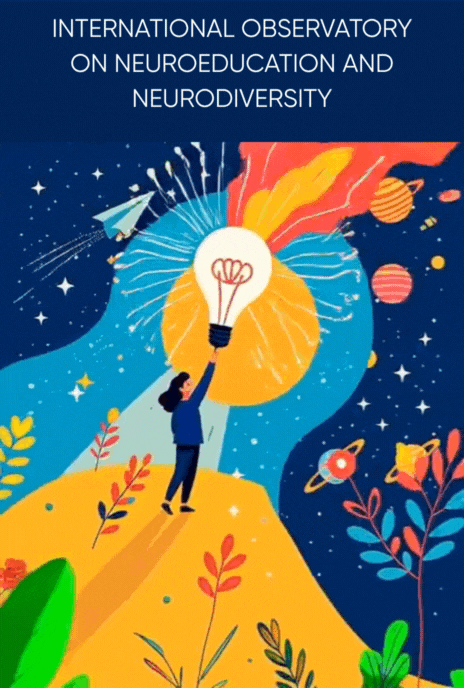

Conclusion
The International Observatory of Neuroeducation and Neurodiversity represents a decisive step toward a more comprehensive, inclusive, and practical understanding of neurological diversity and human learning processes. It has the potential to become a transformative force in education, applied neuroscience, social policy, and in people's lives, delivering innovation and equity on a global scale.
Actualidad
info@observaneuro.com
The International Observatory of Neuroeducation and Neurodiversity® its logo, and slogans constitute industrial property and are either registered or may be in the process of registration with the relevant authorities. Therefore, any unauthorized reproduction thereof by any means is strictly prohibited.
© International Observatory of Neuroeducation and Neurodiversity 2025. All rights reserved.
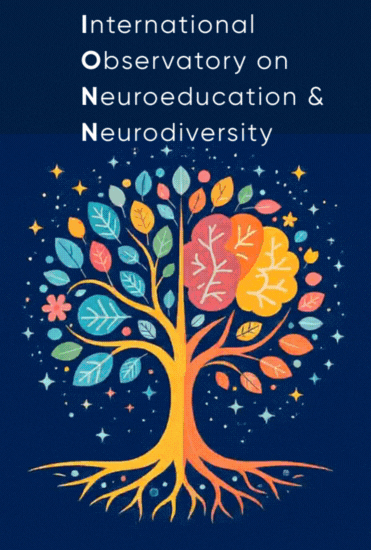

Privacy Policy
